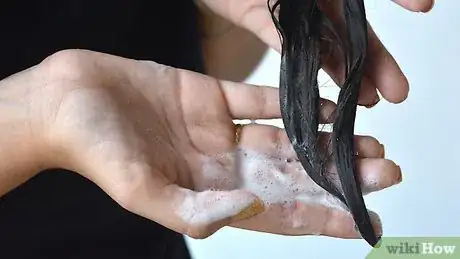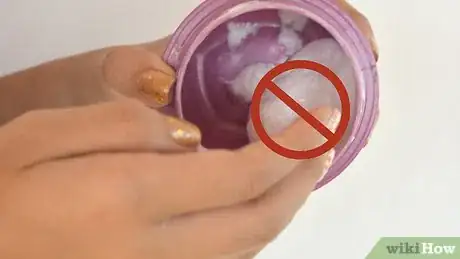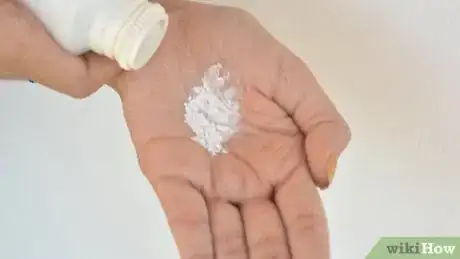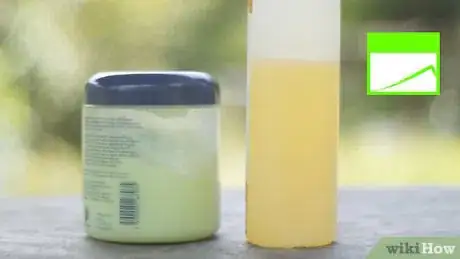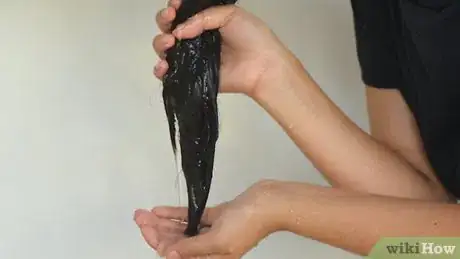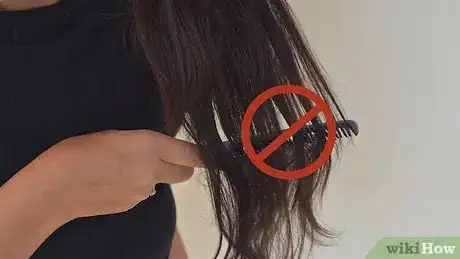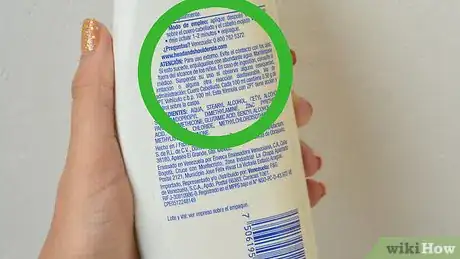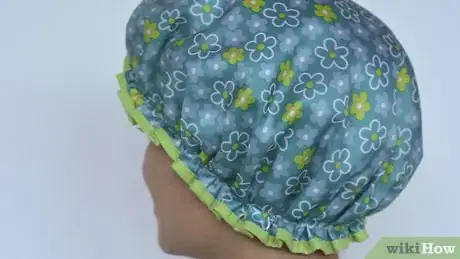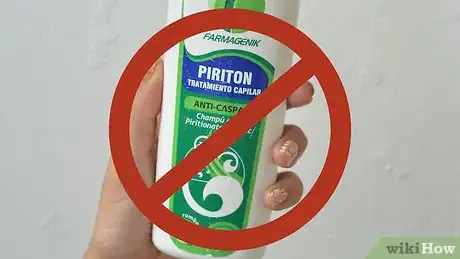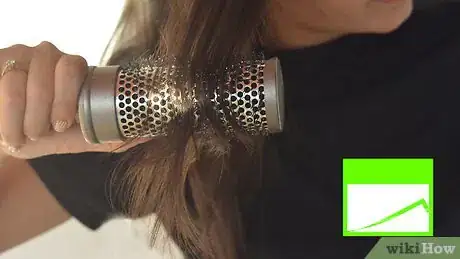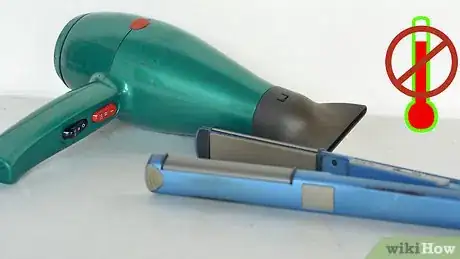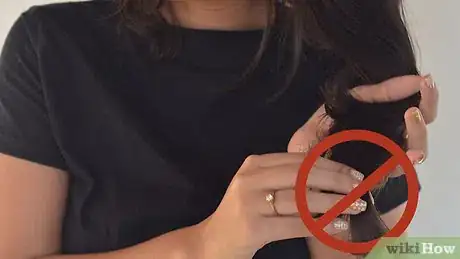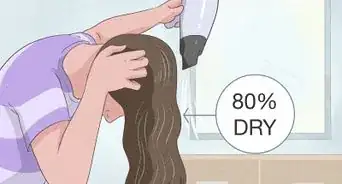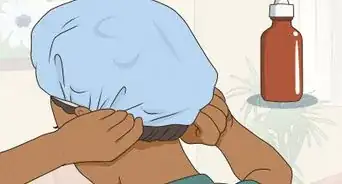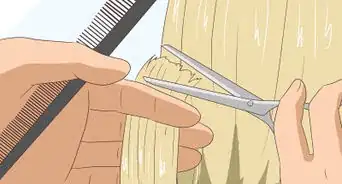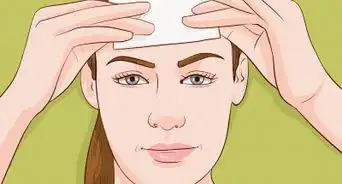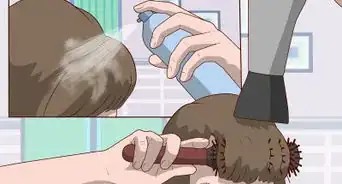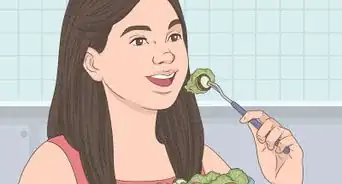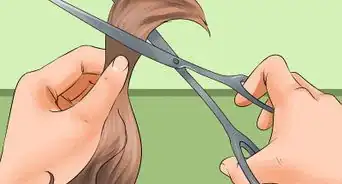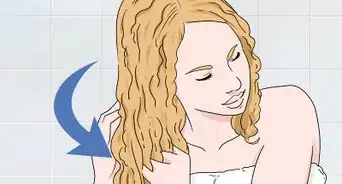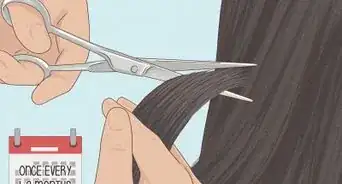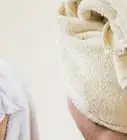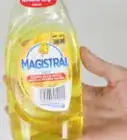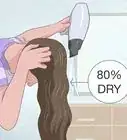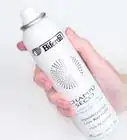This article was co-authored by Shun Pittman. Shun Pittman is a Master Cosmetologist, Author, Owner, and Founder of Corps d’Elite Salon and Corps d’Elite Beauty. With over 25 years of international experience, she is dedicated to and specializes in providing luxury salon services to all hair types and textures and every skin tone and shade. Her services include hair conditioning treatments, cutting, coloring, styling, extensions, and makeup application. Shun has experience working with, coaching, training, and mentoring beauty professionals from multiple companies including L'Oréal, Wella, Matrix, Paul Mitchell, Redken, Big Sexy Hair, and Toni & Guy. She is also a host for national and local media outlets and her work has been featured in The Washingtonian, The Cheddar Network, and WJLA Good Morning Washington's Beauty and Fashion Police segments. Shun is the author of “50 Things Your Hairdresser Wants YOU to Know (and a few things we don’t...)".
This article has been viewed 283,935 times.
Oily hair happens when the sebaceous glands on the scalp become overactive, producing oil in your hair. Science aside, greasy or oily hair is often a result of your hair type and grooming habits. While you can’t change the type of hair you have, there are a variety of ways to make your hair less oily in the short and long term.
Steps
Temporarily Reducing Oil
-
1Shampoo your hair. Choosing the correct shampoo for your hair type and texture will remove oils and dirt from your hair, effectively stripping away oil to clean your head. The quickest, most fool-proof way to instantly remove oily hair is simply a good shower.[1]
- Shower with lukewarm or cool water, as hot water promotes oil creation.
-
2Apply conditioner near the ends of your hair. Conditioner is made to return oils to your hair, which you may not need if your scalp produces a lot of oil. The ends of your hair still need to be nourished, though, so apply your conditioner from mid-length to the ends of your hair strands.[2]Advertisement
-
3Use a vinegar bath as a clarifying treatment. This old-fashioned home remedy relies on vinegar’s properties as an astringent, which constricts or closes oil glands. Mix in 2 tablespoons (29.6 ml) of vinegar with 1 cup water and massage the mixture into your scalp, removing oils and dirt.[3]
- Never use straight vinegar, as the acidity can damage your skin.
- This can be harsh on your hair, so only use this treatment every 3-4 months.
-
4Try a mixture of aloe vera and lemon to fight greasy hair. Mix in a teaspoon of fresh aloe vera (pulled off of a plant) and 2 tablespoons (29.6 ml) of lemon juice in with your normal shampoo and then use it in the shower. Leave the shampoo on your hair for 3-5 minutes after applying so that it soaks in.
- Lemon juice may lighten your hair, so limit the use of this treatment.
- If you'll be going outdoors in the sunlight the same day you use this treatment, cover your hair with a cap. Otherwise, the sun will activate the lemon and lighten your hair.
-
5Use dry shampoo for an instant fix. Dry shampoo bonds with the oil on your hair to prevent it from looking too greasy. Simply use your fingers to spread dry shampoo powder along your scalp and shake out any excess.[4]
- In a pinch, some people swear by baby powder, talc, and cornstarch to quickly get rid of oily hair.
-
6Establish your own routine. Some experts believe the best way to deal with oily hair is to wash it every morning with an oil-controlling hair product. Others say that washing your hair every day will over-stimulate the sebaceous glands. Try both methods to figure out what works for you.[5]
-
7Wash your hair properly.
- Shampoo with lukewarm or cool water.
- Apply shampoo to the scalp.
- If you like to use conditioner, use a clear colored type, and only apply it only to the ends of your hair.
- To help cut down oil production, finish with a cold water rinse.
-
8Brush less. Excessive brushing will stimulate the sebaceous glands and increase oil production.
Making your Hair Less Oily
-
1Pick the right shampoo. Don’t just look for a shampoo that says “for oily hair." Instead, look for the words “clarifying” and “oil reducing." Many companies make specific formulas that for people that have oily hair.[6]
-
2Don’t use shampoo every day. Shampoo does remove oil from your hair. However, using shampoo every day strips your hair of natural oils, and if often produces extra oil to compensate. Try shampooing every other day and note the results after 1-2 weeks.[7]
-
3Limit mousse, gel, and other hair products. Most hair products trap oil near your scalp, causing build-up that results in oily, greasy hair. Stay away from these products whenever possible.[8]
-
4Brush your hair regularly. Regular brushing spreads oil throughout your hair, which prevents shiny or greasy build-up. Aim to brush your hair once a day.
- Excessive brushing, however, can cause your hair to produce more oil, so limit yourself to 1-2 daily.[9]
-
5Stay away from heat. Hot showers, blow-dryers and excessive sunlight all tell your body to produce more oil to protect your hair. Whenever possible, take cold showers and use the cool setting on your blow-dryers to prevent your hair from building up new oils.
-
6Avoid touching your hair. Your hands and face secrete oils as well, so constantly running your fingers through your hair deposits those oils on your head. Cutting this habit can keep your hair from becoming oily throughout the day.[10]
Expert Q&A
-
QuestionWhy is dry shampoo good for oily hair?
 Shun PittmanShun Pittman is a Master Cosmetologist, Author, Owner, and Founder of Corps d’Elite Salon and Corps d’Elite Beauty. With over 25 years of international experience, she is dedicated to and specializes in providing luxury salon services to all hair types and textures and every skin tone and shade. Her services include hair conditioning treatments, cutting, coloring, styling, extensions, and makeup application. Shun has experience working with, coaching, training, and mentoring beauty professionals from multiple companies including L'Oréal, Wella, Matrix, Paul Mitchell, Redken, Big Sexy Hair, and Toni & Guy. She is also a host for national and local media outlets and her work has been featured in The Washingtonian, The Cheddar Network, and WJLA Good Morning Washington's Beauty and Fashion Police segments. Shun is the author of “50 Things Your Hairdresser Wants YOU to Know (and a few things we don’t...)".
Shun PittmanShun Pittman is a Master Cosmetologist, Author, Owner, and Founder of Corps d’Elite Salon and Corps d’Elite Beauty. With over 25 years of international experience, she is dedicated to and specializes in providing luxury salon services to all hair types and textures and every skin tone and shade. Her services include hair conditioning treatments, cutting, coloring, styling, extensions, and makeup application. Shun has experience working with, coaching, training, and mentoring beauty professionals from multiple companies including L'Oréal, Wella, Matrix, Paul Mitchell, Redken, Big Sexy Hair, and Toni & Guy. She is also a host for national and local media outlets and her work has been featured in The Washingtonian, The Cheddar Network, and WJLA Good Morning Washington's Beauty and Fashion Police segments. Shun is the author of “50 Things Your Hairdresser Wants YOU to Know (and a few things we don’t...)".
Master Cosmetologist, Global Salon Educator & Author It absorbs a lot of the oils. You can't use this stuff every day since it will eventually dry your hair out way too much, but it's good if you need to remedy super oily hair every now and then.
It absorbs a lot of the oils. You can't use this stuff every day since it will eventually dry your hair out way too much, but it's good if you need to remedy super oily hair every now and then. -
QuestionWhy is my hair so oily?
 Shun PittmanShun Pittman is a Master Cosmetologist, Author, Owner, and Founder of Corps d’Elite Salon and Corps d’Elite Beauty. With over 25 years of international experience, she is dedicated to and specializes in providing luxury salon services to all hair types and textures and every skin tone and shade. Her services include hair conditioning treatments, cutting, coloring, styling, extensions, and makeup application. Shun has experience working with, coaching, training, and mentoring beauty professionals from multiple companies including L'Oréal, Wella, Matrix, Paul Mitchell, Redken, Big Sexy Hair, and Toni & Guy. She is also a host for national and local media outlets and her work has been featured in The Washingtonian, The Cheddar Network, and WJLA Good Morning Washington's Beauty and Fashion Police segments. Shun is the author of “50 Things Your Hairdresser Wants YOU to Know (and a few things we don’t...)".
Shun PittmanShun Pittman is a Master Cosmetologist, Author, Owner, and Founder of Corps d’Elite Salon and Corps d’Elite Beauty. With over 25 years of international experience, she is dedicated to and specializes in providing luxury salon services to all hair types and textures and every skin tone and shade. Her services include hair conditioning treatments, cutting, coloring, styling, extensions, and makeup application. Shun has experience working with, coaching, training, and mentoring beauty professionals from multiple companies including L'Oréal, Wella, Matrix, Paul Mitchell, Redken, Big Sexy Hair, and Toni & Guy. She is also a host for national and local media outlets and her work has been featured in The Washingtonian, The Cheddar Network, and WJLA Good Morning Washington's Beauty and Fashion Police segments. Shun is the author of “50 Things Your Hairdresser Wants YOU to Know (and a few things we don’t...)".
Master Cosmetologist, Global Salon Educator & Author There are normally two reasons for this. Some people have an overactive sebaceous gland, which excretes too much FIBA. Since FIBA is a natural lubricant, you end up with a greasy or oily scalp. The other way this occurs is when people just use too much product. There are a lot of serums and creams that weigh the hair down and cause it to absorb the stuff you're putting in your hair.
There are normally two reasons for this. Some people have an overactive sebaceous gland, which excretes too much FIBA. Since FIBA is a natural lubricant, you end up with a greasy or oily scalp. The other way this occurs is when people just use too much product. There are a lot of serums and creams that weigh the hair down and cause it to absorb the stuff you're putting in your hair. -
QuestionHow do I figure out why my hair is oily?
 Community AnswerAsk your hairdresser to take a look, as they usually are trained in that field. He/she will look at your scalp, ask about your routine/hobbies (as they may have something to do with it), as well as potentially offer you a solution.
Community AnswerAsk your hairdresser to take a look, as they usually are trained in that field. He/she will look at your scalp, ask about your routine/hobbies (as they may have something to do with it), as well as potentially offer you a solution.
References
- ↑ Shun Pittman. Master Cosmetologist, Global Salon Educator & Author. Expert Interview. 14 April 2021.
- ↑ https://www.luxyhair.com/blogs/hair-blog/how-to-get-rid-of-oily-hair-our-top-6-tips
- ↑ http://naturalbeautytips.co/how-to-get-rid-of-greasy-hair-fast-naturally/
- ↑ Shun Pittman. Master Cosmetologist, Global Salon Educator & Author. Expert Interview. 14 April 2021.
- ↑ https://www.luxyhair.com/blogs/hair-blog/how-to-get-rid-of-oily-hair-our-top-6-tips
- ↑ Shun Pittman. Master Cosmetologist, Global Salon Educator & Author. Expert Interview. 14 April 2021.
- ↑ http://naturalbeautytips.co/how-to-get-rid-of-greasy-hair-fast-naturally/
- ↑ Shun Pittman. Master Cosmetologist, Global Salon Educator & Author. Expert Interview. 14 April 2021.
- ↑ https://www.prevention.com/health/a20428078/15-home-remedies-for-oily-hair/
About This Article
If your hair is too oily, there are ways to stop your scalp producing so much oil. Use dry shampoo for a quick fix for your oily hair. Or, rub some baby powder, talc, or cornstarch into your roots. To stop your hair getting oily in the long term, look for a shampoo designed for oily hair. However, don’t shampoo your hair every day, since this will cause your scalp to produce more oil. Brush your hair once or twice a day to distribute the oil evenly throughout your hair, but don’t brush more often. Brushing your hair too much can increase the oil produced by your scalp. If you use mousse, gel, and other hair products regularly, reduce your use, since these can trap oil near your scalp. For more tips, including how to reduce grease in your hair with aloe vera and lemon, read on!
